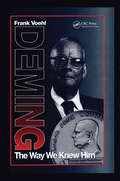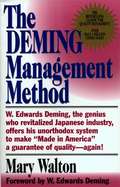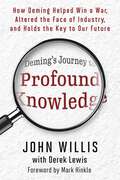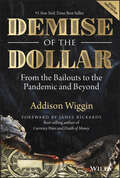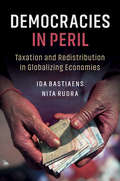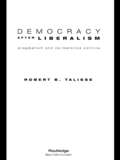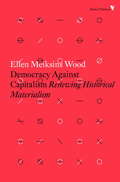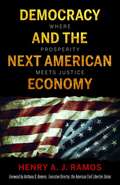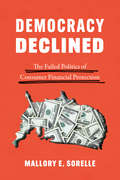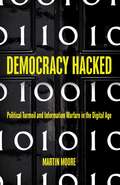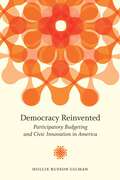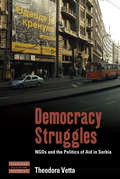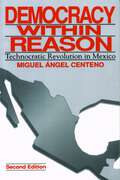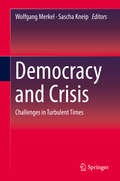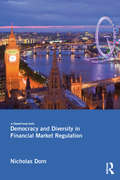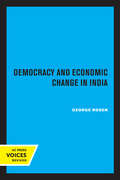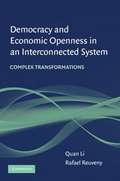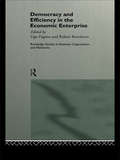- Table View
- List View
Demarketing
by Jim Blythe Nigel BradleyWe all understand the basic principles underpinning marketing activity: to identify unfulfilled needs and desires and boost demand for the solutions a product is offering. The mantra is always "sell more". De-marketing tries for the very opposite. Why would a company actively try to decrease demand? There are many good reasons to do so: a firm cannot supply large enough quantities, or wants to limit supply to a region of narrow profit margin. Or, crucially, to discourage undesirable customers: those that could be bad for brand reputation, or in the case of the finance sector, high risk. De-marketing can yield effective solutions to these issues, effectively curtailing demand yet (crucially) not destroying it. Nevertheless, the fundamental negativity of de-marketing strategies often causes organisations to hide them from view and, as a result, they are rarely studied. This then is the first book to cast light on the secretive, counterintuitive world of de-marketing, deconstructing its mysteries and demonstrating how to incorporate them into a profit-driven marketing plan. A selection of thought leaders in strategic marketing mix theory with illustrative global cases, providing insight into how these strategies have been employed in practice and measuring their successes and failures. It’s a must-read for any student or researcher that wants to think differently about marketing.
Demarketing Soda in New York City
by John A. Quelch Carin-Isabel Knoop Christine Snively Margaret RodriguezIn 2013, New York City Mayor Michael Bloomberg tried and failed to institute a ban on serving sizes of large sugary beverages. Obesity posed a large public health risk to the city. Mayor Bloomberg's proposed ban was one of many attempts to combat the rising threat of obesity. The case discusses the efficacy of the proposed ban on large soda serving sizes in the context of the other anti-obesity initiatives crafted by Bloomberg's administration.
Demarketing: Gezielte Nachfragereduzierung: Typologie und Wahrnehmung einer scheinbar unlogischen Bewegung
by Andreas HesseDieses Buch erläutert die riskante und subtile Strategie des Demarketings. Dabei wird Nachfrage nicht stimuliert, sondern durch verschiedene Maßnahmen gezielt reduziert oder umgelenkt. Die Beweggründe dafür sind unterschiedlich: Sowohl Nachhaltigkeit, soziale Verantwortung, Vertriebssteuerung und Image, als auch Effizienz, Umpositionierung oder schlichtweg Regulierungsvermeidung können Auslöser und Hintergrund sein. Der Autor zeigt strukturiert die verschiedenen Demarketingtypen auf und erläutert die Herangehensweisen und Konsumentenwahrnehmungen aus realen Kampagnen, wie beispielsweise der Marken Patagonia, Bio Company, Levi’s, Heineken, Gustavo Gusto oder KLM.Das erste grundlegende Werk zu Demarketing in deutscher Sprache – theoretisch fundiert und voller praxisrelevanter Hintergründe.
Deming The Way We Knew Him
by Frank VoehlPerhaps no other person in the history of modern business has so profoundly affected the methods of quality improvement in industry than W. Edwards Deming. The subject of many books, articles, and television documentaries, Dr. Deming has become the world-recognized leader of the quality movement in industry.
Deming management method
by Mary WaltonWhether you're the owner of our own small business, a middle manager in a mid-sized company, or the CEO of a multinational, this book can show you how to improve your profits and productivity. How? By following the principles of The Deming Management Method.Middle- and top-echelon managers in particular will find Dr. Deming's method provocative and controversial. He is for a total revamping of the way American managers manage. Some of his pet peeves are: managers who manage by slogans or by setting quotas, managers who don't know what their jobs are and who can't define the responsibilities of the workers under them, managers who tend to blame workers, not realizing that workers want to take pride in their work. Change, Dr. Deming beliees, starts at the top with an informed, quality-conscious management. This book includes excellent advice on how to achieve that level of management expertise in the author's analysis of Dr. Deming's famous 14 Points for Managers and his Deadly diseases of management. Dr. Deming's management techniques are all carefully explained in this detailed, step-by-step treatment of their major points and of their practical applications to everyday business life.A large portion of The Deming Management Method is devoted to practical applications of the method by some of American's most innovative firms, including Honeywell, AT&T and Campbell's Soup.
Deming's Journey to Profound Knowledge: How Deming Helped Win a War, Altered the Face of Industry, and Holds the Key to Our Future
by John WillisFrom the birth of modern industry, to winning WWII, to Japan&’s Economic Miracle, W. Edwards Deming helped shape some of the most profound moments in modern history. Deming, an American engineer and statistician, is widely recognized for his contributions to the field of quality management. But his teachings go beyond quality management; they influence not only how we work today, but also how we can continue to succeed into the future. Part business history, part biography, part journey into deep business sense, author John Willis captures the full picture of Deming&’s life and influence. Most importantly, it reveals the experiences that led to Deming&’s greatest discovery: the System of Profound Knowledge, a collection of fundamental truths that show how any system or process can be transformed into something greater. From the real-life Rosie the Riveter to a hacker writing US cybersecurity law, Deming&’s ingenuity and system of thinking changed how we think in the modern world. This book shows how we can take that influence and continue to apply it our own future.
Demise of the Dollar: From the Bailouts to the Pandemic and Beyond (Agora Ser. #7)
by Addison WigginA devastatingly incisive look at the devaluation of the American dollar and how it impacts you In the newly revised third edition of Demise of the Dollar: From the Bailouts to the Pandemic and Beyond, New York Times and international bestselling author Addison Wiggin delivers yet another timely and insightful account of the devaluation of the American dollar. Fully updated to consider the events of the last ten years—including the COVID-19 pandemic—the book contains nuanced discussions of historic inflation, interest rates and the Federal Reserve, the impact the Euro has had since its introduction, the rise of China prior to the pandemic, cryptocurrencies and the United States’ consumer debt addiction. It also demonstrates how all these factors, and more, are affected by the American dollar’s role as the world’s “reserve currency”. You’ll learn what a weakened American dollar means for your portfolio and how you can best arrange your finances to protect against global macroeconomic risks. You’ll find: Strategies for making your portfolio more resilient against economic shocks, downturns, and crises Explorations of what increasing levels of US consumer debt mean for your investments, and for the world’s largest economics Examinations of how foreign countries have come to control the economic fate of the United States via the issuance of debtA fascinating account of one of the most important trends in American economics in the last hundred years, Demise of the Dollar offers incisive observations about the factors driving the world’s contemporary economies and specific and strategic guidance on how to structure your portfolio to survive, and even thrive, in a new financial environment.
Democracies in Peril: Taxation and Redistribution in Globalizing Economies
by Ida Bastiaens Nita RudraGlobalization is triggering a 'revenue shock' in developing economies. International trade taxes - once the primary source of government revenue - have been cut drastically in response to trade liberalization. Bastiaens and Rudra make the novel argument that regime type is a major determinant of revenue-raising capacity once free trade policies have been adopted. Specifically, policymakers in democracies confront greater challenges than their authoritarian counterparts when implementing tax reforms to offset liberalization's revenue shocks. The repercussions are significant: while the poor bear the brunt of this revenue shortfall in democracies, authoritarian regimes are better-off overall. Paradoxically, then, citizens of democracies suffer precisely because their freer political culture constrains governmental ability to tax and redistribute under globalization. This important contribution on the battle between open societies and the ability of governments to help their people prosper under globalization is essential reading for students and scholars of political economy, development studies and comparative politics.
Democracy
by Rawi AbdelalSurveys scholarship on democracy and democratization. Describes the relationship between democracy and the environment of business, including capitalist economic institutions, economic growth, economic reform, and international relations.
Democracy After Liberalism: Pragmatism and Deliberative Politics
by Robert TalisseThis book critically evaluates liberalism, the dominant attempt in the tradition of political philosophy to provide a philosophical foundation for democracy, and argues for a conception of deliberative democracy to meet this need.
Democracy After The War (Routledge Revivals)
by J. A. HobsonFirst published in 1917, Democracy After the War considers the challenges faced in the development of liberal democracy. Hobson emphasises the power of reactionary forces and their ability to hold back progress, reiterating his view that the crux of the problem lies in the inequalities in income and wealth which led to imperialism. Through analysing the economic foundations of imperialist conflicts, Hobson comes to the conclusion that the success of democracy rests on the recognised importance of personal liberty.
Democracy Against Capitalism: Renewing Historical Materialism
by Ellen Meiksins WoodEllen Meiksins Wood argues that with the collapse of Communism the theoretical project of Marxism and its critique of capitalism is more timely and important than ever. Current intellectual fashions of the left which emphasise 'post-modern' fragmentation, 'difference', contingency and the 'politics of identity' can barely accommodate the idea of capitalism, let alone subject the capitalist system to critique. In this book she sets out to renew the critical programme of historical materialism by redefining its basic concepts and its theory of history in original and imaginative ways, using them to identify the specificity of capitalism as a system of social relations and political power. She goes on to explore the concept of democracy in both the ancient and modern world, examining the concept's relation to capitalism, and raising questions about how democracy might go beyond the limits imposed on it by capitalism.
Democracy And Redistribution (Cambridge Studies In Comparative Politics Ser.)
by Robert H. Bates Ellen Comisso Peter Lange Joel Migdal Helen Milner Carles Boix Martin KleinEmploying analytical tools borrowed from game theory, Carles Boix offers a complete theory of political transitions. It is one in which political regimes ultimately depend on the nature of economic assets, their distribution among individuals, and the balance of power among different social groups. Backed by detailed historical research and extensive statistical analysis from the mid-nineteenth century, the study reveals why democracy emerged in classical Athens. It also covers the early triumph of democracy in nineteenth-century agrarian Norway, Switzerland and northeastern America as well as its failure in countries with a powerful landowning class.
Democracy And The Next American Economy: Where Prosperity Meets Justice
by Henry A. J. RamosProgressive intellectual Henry A. J. Ramos believes the United States is at a crossroads, facing the most challenging moment since the civil rights movement of the late 1960s and early 1970s. In fact, absent major new interventions and investments, he sees this moment as a pivotal turning point in the American journey in which political polarization, income and wealth disparity and public violence"€"much of which is race related"€"threaten the very essence and integrity of our democracy and economy. Ramos examines the policies that have contributed to America's decline, including those that have led to the concentration of great wealth in the hands of a few while condemning many to systemic poverty and inequality. Current economic and social trends, he stresses, are unsustainable and call for organized, concerted action by people of conscience and those affected. <P><P> Ultimately, Ramos provides a roadmap for the future so the United States can continue to provide opportunities for its people and serve again as a leader in the international community. He offers case studies of organizations that have successfully created and administered programs that further equity in society, restore democratic practices, implement better urban and city planning and protect the environment. <P><P> Demonstrating both the critical importance and real possibility of leveraging prosperity and justice for all Americans, this compelling work is a must-read for anyone interested in democracy, economic restoration and environmental sustainability.
Democracy Declined: The Failed Politics of Consumer Financial Protection (Chicago Studies in American Politics)
by Mallory E. SoRelleAs Elizabeth Warren memorably wrote, “It is impossible to buy a toaster that has a one-in-five chance of bursting into flames and burning down your house. But it is possible to refinance an existing home with a mortgage that has the same one-in-five chance of putting the family out on the street.” More than a century after the government embraced credit to fuel the American economy, consumer financial protections in the increasingly complex financial system still place the onus on individuals to sift through fine print for assurance that they are not vulnerable to predatory lending and other pitfalls of consumer financing and growing debt. In Democracy Declined, Mallory E. SoRelle argues that the failure of federal policy makers to curb risky practices can be explained by the evolution of consumer finance policies aimed at encouraging easy credit in part by foregoing more stringent regulation. Furthermore, SoRelle explains how angry borrowers’ experiences with these policies teach them to focus their attention primarily on banks and lenders instead of demanding that lawmakers address predatory behavior. As a result, advocacy groups have been mostly unsuccessful in mobilizing borrowers in support of stronger consumer financial protections. The absence of safeguards on consumer financing is particularly dangerous because the consequences extend well beyond harm to individuals—they threaten the stability of entire economies. SoRelle identifies pathways to mitigate these potentially disastrous consequences through greater public participation.
Democracy Hacked: How Technology is Destabilising Global Politics
by Martin MooreTechnology has fractured democracy, and now there&’s no going back. All around the world, the fringes have stormed the palace of the elites and unleashed data miners, dark ads and bots on an unwitting public. After years of soundbites about connecting people, the social media giants are only just beginning to admit to the scale of the problem. We stand on the precipice of an era where switching your mobile platform will have more impact on your life than switching your government. Where freedom and privacy are seen as incompatible with social well-being and transparency. Where your attention is sold to the highest bidder. Our laws don&’t cover what is happening and our politicians don&’t understand it. But if we don&’t fight to change the system now, we may not get another chance.
Democracy Reinvented: Participatory Budgeting and Civic Innovation in America (Innovative Governance in the 21st Century)
by Hollie Russon GilmanParticipatory Budgeting—the experiment in democracy that could redefine how public budgets are decided in the United States. Democracy Reinvented is the first comprehensive academic treatment of participatory budgeting in the United States, situating it within a broader trend of civic technology and innovation. This global phenomenon, which has been called "revolutionary civics in action" by the New York Times, started in Brazil in 1989 but came to America only in 2009. Participatory budgeting empowers citizens to identify community needs, work withelected officials to craft budget proposals, and vote on how to spend public funds. Democracy Reinvented places participatory budgeting within the larger discussion of the health of U. S. democracy and focuses on the enabling political and institutional conditions. Author and former White House policy adviser Hollie Russon Gilman presents theoretical insights, indepth case studies, and interviews to offer a compelling alternative to the current citizen disaffection and mistrust of government. She offers policyrecommendations on how to tap online tools and other technological and civic innovations to promote more inclusive governance. While most literature tends to focus on institutional changes without solutions, this book suggests practical ways to empower citizens to become change agents. Reinvesting in Democracy also includes a discussion on the challenges and opportunities that come with using digital tools to re-engage citizens in governance.
Democracy Struggles: NGOs and the Politics of Aid in Serbia (Dislocations #25)
by Theodora VettaTracing the boom of local NGOs since the 1990s in the context of the global political economy of aid, current trends of neoliberal state restructuring, and shifting post-Cold War hegemonies, this book explores the “associational revolution” in post-socialist, post-conflict Serbia. Looking into the country’s “transition” through a global and relational analytical prism, the ethnography unpacks the various forms of dispossession and inequality entailed in the democracy-promotion project.
Democracy Within Reason: Technocratic Revolution in Mexico
by Miguel Angel CentenoDuring the 1980s the Mexican regime faced a series of economic, social, and political disasters that led many to question its survival. Yet by 1992 the economy was again growing, with inflation under control and the confidence of international investors restored. Mexico was now touted as an example for regimes in Eastern Europe to emulate.How did Carlos Salinas and his team of technocrats manage to gain political power sufficient to impose their economic model? How did they sustain their revolution from above despite the hardships these changes brought for many Mexicans? How did they stage their remarkable political comeback and create their “democracy within reason”? Why did Salinas succeed in keeping control of his revolution while Mikhail Gorbachev failed to do so in his similar effort at radical reform?Miguel Centeno addresses these questions by analyzing three critical developments in the Mexican state: the centralization of power within the bureaucracy; the rise of a new generation of technocrats and their use of a complex system of political networks; and the dominance of a neoliberal ideology and technocratic vision that guided policy decisions and limited democratic participation. In his conclusion the author proposes some alternative scenarios for Mexico’s future, including the role of NAFTA, and suggests lessons for the study of regimes undertaking similar transitions.Of obvious interest to students of contemporary Mexico and Latin America, the book will also be very useful for those analyzing the transition to the market in other countries, the role of knowledge in public policy, and the nature of the modern state in general.
Democracy Without Decency: Good Citizenship and the War on Poverty (G - Reference, Information and Interdisciplinary Subjects)
by William M. EpsteinThe conservative attacks on the welfare system in the United States over the past several decades have put liberal defenders of poverty relief and social insurance programs on the defensive. In this no-holds-barred look at the reality of American social policy since World War II, William Epstein argues that this defense is not worth mounting—that the claimed successes of American social programs are not sustained by evidence. Rather than their failure being the result of inadequate implementation or political resistance stemming from the culture wars, these programs and their built-in limitations actually do represent what the vast majority of people in this country want them to be. However much people may speak in favor of welfare, the proof of what they really want is in the pudding of the social policies that are actually legislated. The stinginess of America’s welfare system is the product of basic American values rooted in the myth of “heroic individualism” and reinforced by a commitment to social efficiency, the idea that social services need to be minimal and compatible with current social arrangements.
Democracy and Crisis: Challenges In Turbulent Times
by Wolfgang Merkel Sascha KneipIn light of the public and scholarly debates on the challenges and problems of established democracies, such as a lack of participation, declining confidence in political elites, and the deteriorating capabilities of democratic institutions, this volume discusses the question whether democracy as such is in crisis. On the basis of the shared concept of embedded democracy, it develops a range of conceptual approaches to empirically analyzing the challenges of democracy and their potential transformation into crisis phenomena. The book is divided into three parts, the first of which highlights various aspects of political participation, such as political inequality in voting. In turn, Part II focuses on problems of political representation, while Part III assesses whether processes such as globalization, deregulation, and the withdrawal of the state from important policy areas have limited the political control and legitimacy of democratically elected governments.
Democracy and Diversity in Financial Market Regulation
by Nicholas DornFinancial markets have become acknowledged as a source of crisis, and discussion of them has shifted from economics, through legal and regulatory studies, to politics. Events from 2008 onwards raise important, cross-disciplinary questions: must financial markets drive states into political and existential crisis, must public finances take over private losses, must citizens endure austerity? This book argues that there is an alternative. If the financial system were less 'connected', contagion within the market would be reduced and crises would become more localised and intermittent, less global and pervasive. The question then becomes how to reduce connectedness within financial markets. This book argues that the democratic direction of financial market policies can deliver this. Politicising financial market policies – taking discussion of these issues out of the sphere of the 'technical' and putting it into the same democratically contested space as, for example, health and welfare policies – would encourage differing policies to emerge in different countries. Diversity of regulatory regimes would result in some business models being attracted to some jurisdictions, others to others. The resulting heterogeneity, when viewed from a global perspective, would be a reversal of recent and current tendencies towards one single/global 'level playing field', within which all financial firms and sectors have become closely connected and across which contagion inevitably reigns. No doubt the democratisation of financial market policy would be opposed by big firms – their interests being served by regulatory convergence – and considered macabre by some financial regulators and central bankers, who are coalescing into an elite community. However, everyone else, Nicholas Dorn argues here, would be better off in a financial world characterised by greater diversity.
Democracy and Economic Change in India
by George RosenThis title is part of UC Press's Voices Revived program, which commemorates University of California Press’s mission to seek out and cultivate the brightest minds and give them voice, reach, and impact. Drawing on a backlist dating to 1893, Voices Revived makes high-quality, peer-reviewed scholarship accessible once again using print-on-demand technology. This title was originally published in 1966.
Democracy and Economic Openness in an Interconnected System
by Quan Li Rafael ReuvenyIn this book, Quan Li and Rafael Reuveny combine the social scientific approach with a broad, interdisciplinary scope to address some of the most intriguing and important political, economic, and environmental issues of our times. Their book employs formal and statistical methods to study the interactions of economic globalization, democratic governance, income inequality, economic development, military violence, and environmental degradation. In doing so, Li and Reuveny cross multiple disciplinary boundaries, engage various academic debates, bring the insights from compartmentalized bodies of literature into direct dialogue, and uncover policy tradeoffs in a growingly interconnected political-economic-environmental system. They show that growing interconnectedness in the global system increases the demands on national leaders and their advisors; academicians and policy makers will need to cross disciplinary boundaries if they seek to better understand and address the policy tradeoffs of even more complex processes than the ones investigated here.
Democracy and Efficiency in the Economic Enterprise (Routledge Studies in Business Organizations and Networks #Vol. 1)
by Robert Rowthorn Ugo PaganoThe collapse of central planning was hailed as evidence of the economic and moral superiority of capitalism over any possible alternative. The essays in this book challenge that claim. The case for more democratic forms of enterprise management is considered from a variety of viewpoints. One chapter deals with the philosophical justification for enterprise democracy. The remaining chapters are devoted to the question of efficiency, which has been central to economic debates about ownership and control. The orthodox belief amongst economists is that any shift to more democratic forms of enterprise control would be unworkable. The essays in this book provide a thorough theoretical and empirical critique of this orthodoxy.



